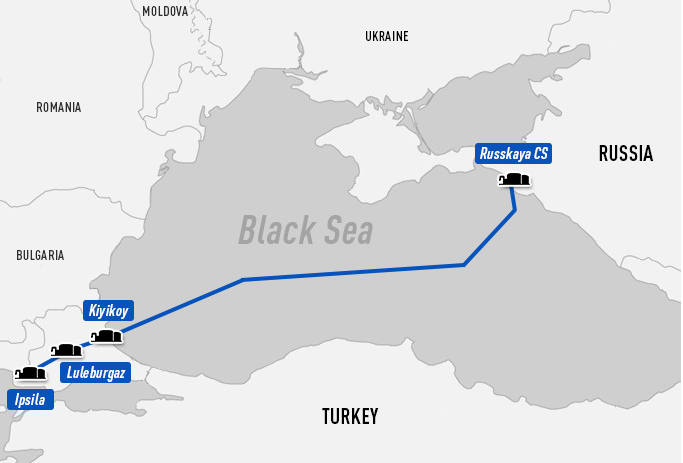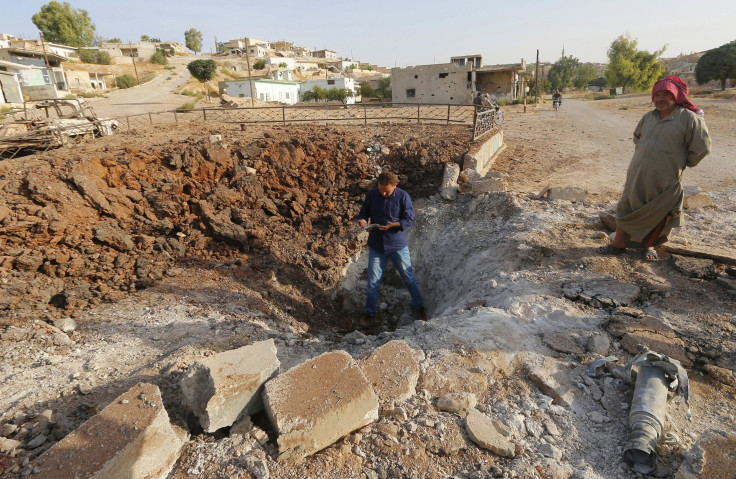As Russia Steps Up Strikes in Syria, Energy Deals Waver

As Russia ramps up its air and rocket strikes in Syria and continues its military push to defend pro-regime forces, its energy deals, largely dependent on Turkey's cooperation, are in jeopardy. This week talks stalled between Russia and Turkey over the new Turkish Stream pipeline, a project originally set to deliver gas to Europe, because the two countries disagree over military intervention in Syria. Turkey, allied with the U.S., supports the rebels, and Russia supports the regime of President Bashar Assad.
Russia planned to deliver as much as 63 billion cubic meters of gas a year to Turkey and southeastern Europe, or more than a third of its fuel exports to the European Union, as part of its plans to stop shipping gas through Ukraine. But that plan is already changing. Russia announced this week it was going to cut the proposed energy supply in half. Turkish President Recep Tayyip Erdogan on Sunday said Russia made a “grave mistake” by intervening militarily in Syria.
"The steps Russia is taking and the bombing campaign in Syria are quite unacceptable to Turkey," Erdogan told reporters at Istanbul airport before leaving for a visit to France last week.
Russia announced Wednesday it may delay the launch of the first line of the pipeline project until the end of 2017, Alexander Medvedev, the company's deputy CEO, told reporters on Wednesday, Reuters reported.
The proposed the Turkish Stream pipeline was supposed to transport the majority of the gas exported from Russia. Ankara and Moscow agreed on the route for the 700-mile pipeline and said it could begin delivering oil as early as December 2016. The pipeline is supposed to run from Russia through the Black Sea to the Greece-Turkey border. The Turkish Stream would reach Turkey in the village of Kiyikoy, and the delivery hub would be close to the town of Luleburgaz, while the pipeline would terminate on the Turkish-Greek border in the area of Ipsila.
Russian state-owned energy giant Gazprom announced earlier this year it had reached a deal with the Turkish government on the construction of the pipeline. Gazprom is Europe’s biggest natural gas supplier.
The ongoing feud between Turkey and Russia could have consequences not only for Gazprom, but for Turkey, too.

The Turkish government has been making the case over the past year that it is best positioned, both geographically and politically, to find a solution to Europe’s energy problem -- the continent depends largely on Russian natural gas exports for energy, even as it is locked in a confrontation with the country over its role in the eastern Ukrainian war.
Natural gas and oil to the northeast of Turkey, in the Caspian Sea basin and beyond, constitute about 65 percent of the world’s total known reserves; 65 percent of the world’s consumption of oil and gas happens to the west of Turkey. That geographical accident, combined with a democratically elected government and rising regional clout, is leading Turkey into a role as a reliable energy pathway that sidesteps active war zones to its north and south.
Russia solidified other energy deals, besides the one it has with Turkey, at the Eastern Economic Forum last month that are also now in danger of being put on hold, including two major deals with Germany, an ally of the U.S. in Syria.
© Copyright IBTimes 2024. All rights reserved.





















